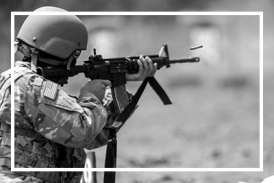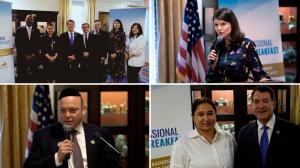Congressional Breakfast: Peace and Cooperation Unites Global Leaders to Champion Moral Leadership and Peacebuilding
Peace and Cooperation emerged as a vital high-level forum convening key voices in international politics
At the heart of the discussions was a broad recognition of the United States’ unique and historic leadership—particularly under President Donald J. Trump—in transforming the diplomatic framework of the Middle East. Achievements such as the Abraham Accords and a fortified U.S.-Israel alliance were hailed by multiple speakers as emblematic of a bold, morally grounded approach to foreign policy that has reshaped a region long mired in strife.
Delegates also called for a renewed international coalition, anchored in shared democratic values, religious tolerance, and economic cooperation, to pursue lasting peace and political cohesion. Speakers emphasized that peace is not only a regional goal but a global obligation, with the United States expected to remain at the helm of these efforts.
Faith-based diplomacy, strategic partnerships, and a recommitment to moral clarity surfaced as recurring principles throughout the morning. The breakfast reaffirmed the belief that sustainable peace requires not just smart policy, but spiritual conviction and ethical leadership.
Kateryna Odarchenko, Head of Washington-based think tank PolitA, reflected on the symbolic and ethical foundation of institutions:
“In my remarks, I spoke about the Mishkan—the sanctuary built not of gold or empire, but of humble materials contributed with purpose. It reminds us that true legitimacy does not come from scale or spectacle, but from the values on which institutions stand. At PolitA, we confront moral fatigue, propaganda, and post-war uncertainty with a simple conviction: that democratic governance without ethics is empty. Today’s global challenges—whether it’s rebuilding trust in Ukraine, stabilizing fragile democracies, or confronting authoritarian resurgence—require not only smart policy, but moral clarity. That’s why this breakfast is not just ceremonial—it’s a compass. It reminds us that political leadership must begin with spiritual leadership.”
Duvi Honig, founder and CEO of the Orthodox Jewish Chamber of Commerce, issued a compelling call for moral consistency in global diplomacy and the strengthening of international alliances, particularly in defense of Israel:
“Peace begins with common sense—pasekh seykhl. When we advocate to politicians, especially regarding votes at the UN, we must demand accountability and consistency. If you claim to share our democratic and moral values, do not vote against us. We feel betrayed when allies take actions that contradict those values. This applies equally to Israel, Ukraine, Korea, and beyond. We must build bridges—between communities, nations, and faiths—that stand on the foundation of mutual respect and shared principles. Supporting Israel should not be a political afterthought, but a moral imperative rooted in the values we all proclaim to defend.”
A powerful presence at the breakfast was Citix, a leading technology company from Kazakhstan and Central Asia known for its cutting-edge smart urban gadgets, took part in the prestigious Congressional Prayer Breakfast in Washington, D.C. Known as a pioneer in digitizing urban infrastructure, Citix is one of the largest Smart City and AdTech companies in Kazakhstan and is strengthening its presence in the markets of Türkiye and the MENA region. The company transforms cities through a unique ecosystem of urban technologies and integrated advertising solutions. Citix’s participation in the Prayer Breakfast marks not only its expansion into the American market but also its commitment to building international partnerships and fostering cross-cultural dialogue. Representing Citix at the event was Aidana Mukhtarkyzy, Co-founder and Chief Business Development Officer, who emphasized the vital role of interfaith dialogue in promoting peace and international cooperation amid rising geopolitical tensions:
“In a time of growing uncertainty, platforms like the Congressional Prayer Breakfast remind us of the power of unity, understanding, and shared values across borders.”
Three panels explored the intersection of faith, governance, and humanitarian recovery. The first examined the moral dimensions of peacebuilding in Israel and Eastern Europe. The second panel addressed the role of religious institutions in responding to humanitarian crises and preserving family and national identity. The third addressed long-term visions for rebuilding post-war societies—with a focus on justice, economic renewal, and democratic partnerships.
Dina Shaikhislam, a seasoned Political and Government Relations Consultant at SIC Group, contributed her expertise in international diplomacy. She advocated for a values-based, cooperative response to the global instability impacting the Middle East and beyond. Emphasizing the role of faith and ethics in diplomacy, she stressed the importance of principled voices and cross-sector dialogue in designing sustainable policy solutions.
Distinguished guests included: ambassador Oksana Markarova (Ukraine to the U.S.), John Herbst (Former U.S. Ambassador to Ukraine; Senior Director, Atlantic Council’s Eurasia Center), Paolo von Schirach (President, Global Policy Institute; Professor at Bay Atlantic University), H.E. Ambassador Dr. Tiffany Lancaster (UN Ambassador Special Envoy for Public Affairs), Shelby Magid (Deputy Director, Atlantic Council’s Eurasia Center), Uriel Shtern (Public Figure), Vadym Melnyk (Legal Expert in Economic Security and Administrative Law), Roman Palchykov (Chairman, Charitable Foundation “The First Fund for the Restoration of Ukraine”), among others.
This timely forum underscored that the global community, led by the United States and its allies, must meet today’s geopolitical challenges with a spirit of unity, a commitment to moral leadership, and concrete partnerships that transcend borders.
For media inquiries or further information, contact:
: https://institute-polita.us/
https://polita-org.ua/
Kateryna Odarchenko
Institute for democracy and development “PolitA”
+1 240-234-5187
email us here
Legal Disclaimer:
EIN Presswire provides this news content "as is" without warranty of any kind. We do not accept any responsibility or liability for the accuracy, content, images, videos, licenses, completeness, legality, or reliability of the information contained in this article. If you have any complaints or copyright issues related to this article, kindly contact the author above.
Micro Drone Market Growth Insights and Statistical Analysis to show Expanding Industry Size
Morepen Laboratories Limited Expands to UAE: Step-Down Subsidiary in Dubai Mainland Support from Start Any Business
Upcycled Micro-Machines Go Global: Mecrob® Debuts as W.A.Y Studio’s New Art Brand
Więcej ważnych informacji
 Jedynka Newserii
Jedynka Newserii

 Jedynka Newserii
Jedynka Newserii

Polityka

D. Joński: Nie wiemy, co zrobi Rosja za dwa–trzy lata. Według duńskiego wywiadu może zaatakować kraje nadbałtyckie i musimy być na to gotowi
Zdecydowana większość krajów unijnych wskazuje na potrzebę wzmocnienia zdolności obronnych Europy w obliczu coraz bardziej złożonego geopolitycznego tła. Wywiady zachodnich państw wskazują, że Rosja może rozpocząć konfrontację z NATO jeszcze przed 2030 rokiem. Biała księga w sprawie obronności europejskiej „Gotowość 2030” zakłada m.in. ochronę granic lądowych, powietrznych i morskich UE, a sztandarowym projektem ma być Tarcza Wschód. – W budzeniu Europy duże zasługi ma polska prezydencja – ocenia europoseł Dariusz Joński.
Transport
Duże magazyny energii przyspieszą rozwój transportu niskoemisyjnego w Europie. Przyszłością może być wodór służący jako paliwo i nośnik energii

Zmiany w europejskim transporcie przyspieszają. Trendem jest elektromobilność, zwłaszcza w ramach logistyki „ostatniej mili”. Jednocześnie jednak udział samochodów w pełni elektrycznych w polskich firmach spadł z 18 do 12 proc., co wpisuje się w szerszy europejski trend spowolnienia elektromobilności. Główne bariery to ograniczona liczba publicznych stacji ładowania, wysoka cena pojazdów i brak dostępu do odpowiedniej infrastruktury. – Potrzebne są odpowiednio duże magazyny taniej energii. Przyszłością przede wszystkim jest wodór – ocenia Andrzej Gemra z Renault Group.
Infrastruktura
W Polsce w obiektach zabytkowych wciąż brakuje nowoczesnych rozwiązań przeciwpożarowych. Potrzebna jest większa elastyczność w stosowaniu przepisów

Pogodzenie interesów konserwatorów, projektantów, inwestorów, rzeczoznawców i służby ochrony pożarowej stanowi jedno z największych wyzwań w zakresie ochrony przeciwpożarowej obiektów konserwatorskich. Pożary zabytków takich jak m.in. katedra Notre-Dame w Paryżu przyczyniają się do wprowadzania nowatorskich rozwiązań technicznych w zakresie ochrony przeciwpożarowej. W Polsce obowiązuje już konieczność instalacji systemów detekcji. Inwestorzy często jednak rezygnują z realizacji projektów dotyczących obiektów zabytkowych z uwagi na zmieniające się i coraz bardziej restrykcyjne przepisy czy też względy ekonomiczne.
Partner serwisu
Szkolenia

Akademia Newserii
Akademia Newserii to projekt, w ramach którego najlepsi polscy dziennikarze biznesowi, giełdowi oraz lifestylowi, a także szkoleniowcy z wieloletnim doświadczeniem dzielą się swoją wiedzą nt. pracy z mediami.





![Nestlé w Polsce podsumowuje wpływ na krajową gospodarkę. Firma wygenerowała 0,6 proc. polskiego PKB [DEPESZA]](https://www.newseria.pl/files/1097841585/fabryka-nesquik_1,w_85,r_png,_small.png)



.gif)

 |
| |
| |
|